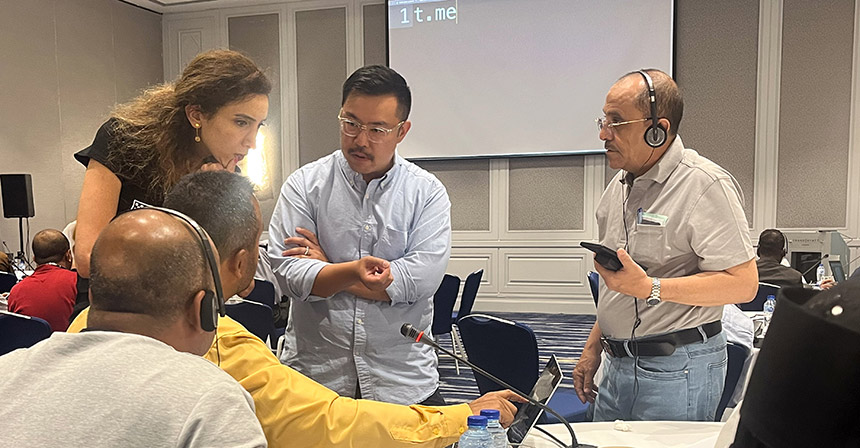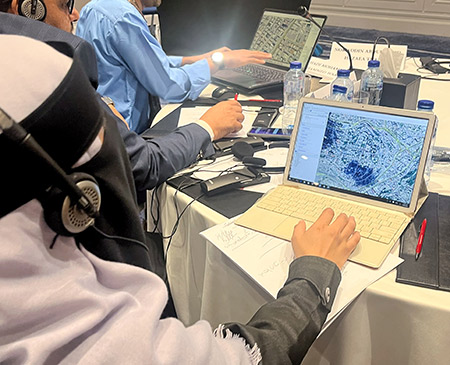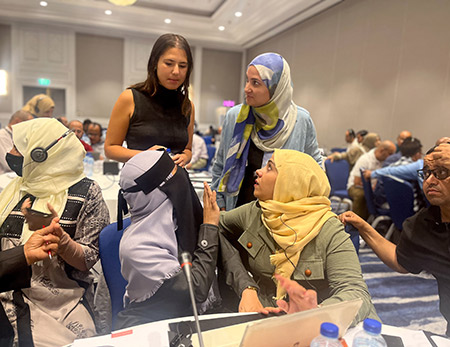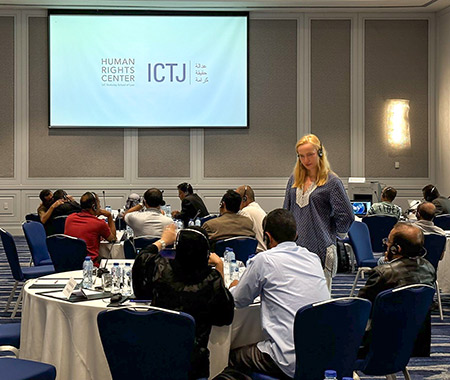
By Andrew Cohen
Berkeley Law’s Human Rights Center conducts free training programs, worldwide, on digital open source investigations of international criminal and humanitarian violations to organizations and professionals across several disciplines. Its latest offering — an intense program for 49 members of Yemen’s National Commission to Investigate Alleged Violations of Human Rights — took place over a recent five-day period in Jordan.
Organized by the International Center for Transitional Justice (ICTJ), the training helped field monitors and investigators who work in different regions across Yemen and face varied challenges documenting abuses by different parties to the conflict wreaking havoc in the country.

Yemen faces jarring concerns amid the country’s ongoing turmoil, including extrajudicial killings, forced disappearances, the targeting and bombing of civilian areas, forced displacement, torture, and the recruitment of children into armed groups. The commission’s investigators and field monitors, mainly judges, lawyers, and journalists, called the workshops practical, illuminating, and hugely helpful.
“The program was extremely significant due to the wealth of diverse knowledge and skills imparted by a proficient training team from the Human Rights Center,” says field monitor Maher al Absi. “We’re only at the beginning of our journey in this field. Throughout the workshops, various sessions covered a range of crucial topics.”
Providing foundational training tailored to Yemen’s specific needs, the center worked from the Berkeley Protocol on Digital Open Source Investigations it developed — increasingly used in Ukraine and other countries facing egregious human rights violations and now translated into six languages.
Workshops focused on how to verify the authenticity of photos, videos, and other data collected during research, al Absi explains, were vital because any presence of fabricated content can undermine an entire investigation process if left unnoticed.
Participants learned how to employ satellite image applications such as Google Earth Pro and Geolocation — which help pinpoint the geographical coordinates of any user or device utilizing location services such as GPS, communication networks, or IP addresses — and how to prepare a meticulous final report.
“Establishing a well-prepared investigation team is of paramount importance since there should be a proper and equitable allocation of tasks and responsibilities, followed by meticulously planning a systematic work strategy until completion,” he says. “All these steps precede the practical investigative phase, as they’re the bedrock for the overall success of the investigation process. Subsequently, I learned a number of pivotal subjects that help in conducting investigations via open sources.”
Creating a roadmap
Brian Nguyen, a Human Rights Center research manager, leads the training sessions. He also contributes to legal investigations through the center’s Technology, Law & Policy program, and before his current appointment co-led an open source investigation related to repression in Myanmar for the Associated Press within the center’s Investigation Lab. Nguyen will lead another training organized by ICTJ in Tunisia for Libyan investigators in October.
Calling it “incredibly meaningful” to support people striving to hold perpetrators accountable for human rights atrocities, Nguyen says he regularly thinks of a quote on a wall of the center’s main training partner, the Institute for International Criminal Investigations.

“Its founder, Raymond McGrath, said: ‘Our particular goal is modest, but indispensable: while we can’t change the political climate, we can train investigators to the highest standards so that when the day of reckoning finally comes for those responsible for the worst humanity has to offer, as it almost always does, the best of what humanity has to offer will be ready.’ And that’s what we’re doing.”
The latest gathering presented new challenges. It was by far the largest group Nguyen and his colleagues have trained, and was held entirely in Arabic with interpreters translating his lectures and live tool demonstrations also presented in Arabic.
Re-crafting exercises to focus on Yemen’s specific human rights abuses, Nguyen took satisfaction in seeing where the training clicked for participants as they began to understand
how to apply the techniques to their own work.
“It’s almost always the case that at the beginning of these training sessions, participants are overwhelmed by the amount of technical information and processes open source investigations demand,” he says. “And it’s always the case that at some point in the week, that changes for the participant and they begin to run with the ideas we’re showing them.”
A more versatile toolbox
Commission member Eshraq al-Maqtari relished how the workshops addressed numerous existing shortcomings that pose challenges faced by field monitors, especially with the hurdles for witnesses and victims to provide substantial and admissible evidence.
“Benefitting from open sources to acquire supplementary evidence — even if they don’t reach the threshold of conclusive and decisive proof — holds significance as they can serve as supporting clues and evidence,” she says. “Many subjects covered during the training workshop will undoubtedly circle back to influence the content and caliber of legal documents. Post-workshop, both the field monitor and the investigator will be well-informed about rectifying any gaps in evidence, ensuring their accuracy. Consequently, this offers an opportunity to victims and witnesses who have come forward to have access to redress and reparation.”

Using a mix of lectures and hands-on group work, the tailored exercises provided a deeper understanding of Yemen’s digital landscape. Following the training, an additional day was used for mental health and psychosocial support.
Nguyen was supported by HRC staff members Ceren Fitoz and Maggie Andresen. “The biggest surprise for me was learning about how weak the cybersecurity infrastructure in Yemen is,” Andresen says. “Understanding that reality informed how Brian tailored this specific training for maximum impact.”
Nour El Bejjani, ICTJ’s head of Lebanon and Yemen programming, says knowing the many barriers the Yemen Commission members face in accessing information, given the difficult conditions in their country, fueled a push to address these challenges head-on.
“We were able to identify the right experts who can highlight the utility and central role of open-source information in documenting and investigating human rights violations and in overcoming access restrictions, while at the same time highlighting the many risks and challenges of online disinformation,” she says.
Increasingly important
In an evolving digital age with never-ending cycles of violence faced by numerous countries, open-source intelligence has become more and more vital in exposing human rights violations and perpetrators.
“Therefore, training programs on principles and methodologies in conducting effective digital investigations should be applied in different countries aiming to promote a consistent approach to those investigations,” El Bejjani says. “That means different groups contributing in one way or another to uncovering war crimes and human rights violations … giving them an opportunity and tools to challenge false narratives in pursuit of truth and justice.”
Noting that accountability and guarantees of non-recurrence are crucial to safeguard victims’ rights, participants lament that this objective is often overlooked in the aftermath of war. Documenting and investigating war-related violations require not only standard evidentiary material, but also supplementary evidence needed by national judiciary and investigative committees to construct a valid legal framework to facilitate capable accountability proceedings.
Given the special nature of such violations and the regular difficulties in surfacing sufficient conventional evidence, recognizing contemporary evidence that’s accessible through social media platforms and websites to safeguard and promote human rights is significant.
“This workshop is the first professional exemplary training workshop directed at monitors and auxiliary investigators tasked with the responsibilities of documenting and verifying data as well as preparing legal dossiers,” al-Maqtari says. “It teaches them how to source supplementary evidence from open sources while ensuring the veracity and credibility of the provided information, videos, images, reports, datasets, and statements, in addition to the methods used for the analysis and collection of such information.”
Strategic surveillance
Commission field monitor Entisar al Mijhasi notes that such investigative work does not require vast expenses because of the abundance of valuable information accessible on social media platforms. This includes a wide spectrum of data, she adds, ranging from miscellaneous details to primitive sources including video clips, images, tweets, and group chats within platforms like WhatsApp and Telegram.
She credits the Human Rights Center training program for comprehensively addressing the role of research in a methodical and scientific manner.
“This included an exploration of global and regional research methodologies, techniques for gathering information, and analyzing satellite images, as well as research techniques involving user archives and the analysis of media-covered images and videos,” al Mijhasi says. “In-depth training courses like this remain essential to attain strategic objectives in efficiently collecting information from open sources, employing both direct and indirect methods, and ensuring a high level of accuracy.”
She identifies as pivotal in the commission’s work precision, thorough research of all platforms, the best available technology tools to document individual profiles and pinpoint locations, and effective communication and coordination.
“This helps in acquiring, confirming, documenting, and understanding incident-related information directly from the victims themselves or their families,” al Mijhasi says.